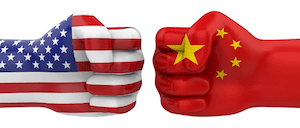By Adrienne Braumiller, Founding Partner, BLG
On December 2nd, the House of Representatives unanimously passed a bill that may ultimately cause Chinese companies to be delisted from the U.S. stock exchange. The purpose of the bill is to allow U.S. accounting regulators to audit Chinese companies that are traded on the U.S. stock exchange. To date, Chinese law makes it illegal for Chinese companies to be subject to the same foreign oversight that other countries have. Currently, Chinese companies are required to maintain their books in the mainland of China, and do not have to provide information to U.S. agencies. Aside from the potential for Chinese companies being delisted from the U.S. stock exchange, it is likely this bill will have larger implications when it comes to U.S. and Chinese relations.
While the bill does not specifically target China, it seems that Chinese companies will be the most affected. For the most part, this is because other countries already allow U.S. agencies to regulate their companies. If China does not agree to the new bill, and Chinese companies are forced off of the U.S. stock exchange, these Chinese companies may be hesitant to continue trading with their U.S. counterparts. This could ultimately lead to additional tension between the two nations. For instance, the Chinese government may not accept the changes in the new bill and instead may levy additional retaliatory tariffs on U.S. imports. If this were to occur, the U.S. could place additional tariffs on Chinese goods at a time where many U.S. businesses were hopeful that the tariffs may be removed.
However, it seems that the rising tension between the U.S. and China will continue. President elect Joe Biden has recently stated that he does not intend to remove the Section 301 tariffs when he gets in office. These statements come at a time when many companies have been waiting to see if Section 301 exclusions would be extended beyond the current expiration dates; most exclusions are set to expire on December 31st. Meaning, companies who have been able to avoid paying the additional tariff will now be required to pay, unless an extension process is released within the next few weeks. Many people within the trade industry are not hopeful that the exclusions will be extended before December 31st as President Trump focuses on other policy issues before leaving office.
While some companies wait and see whether their Section 301 exclusion(s) will expire, others are taking a more proactive approach in an attempt to obtain some of the money back they have paid. This alternative approach is due to the fact that some Section 301 exclusions were not granted until after certain entries were beyond the protest period. This means that although some companies had a successful exclusion, they were not able to obtain the full amount of refunds for the Section 301 duties they had already paid. There is currently a group of companies and trade associations that are urging Capitol Hill to include language in a future omnibus bill that would allow CBP to refund entries even on post 180-day liquidated entries. If successful, importers who were unable to obtain complete relief from the tariffs would be able to retroactively obtain refunds by submitting protests. This relief would be welcomed by most importers as it does not appear that the relationship between the U.S. China will be mended within the upcoming months.
For any additional inquiries, or if you would like to discuss current relations with the U.S. and China in more detail, please contact Adrienne Braumiller at [email protected].

























